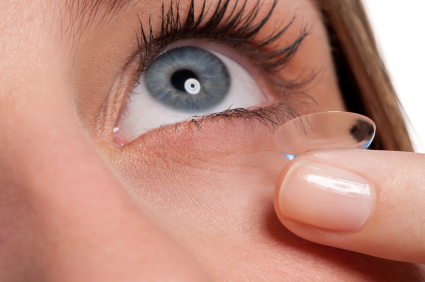Contact Lenses
Through Dr. Cecchini's expertise, we can fit contacts for all ages, with all types of eyeglass prescriptions. He also specializes in fitting contact lenses for unusual prescriptions, such as astigmatism, bifocals, and custom-tinted contact lenses. The latest generation of healthier materials for both soft and rigid gas permeable lenses have made it easier and safer to wear contact lenses than ever before. Dr. Cecchini has the expertise to help correct vision when refractive surgery is not successful.

Bifocal Contact Lenses
Progressive addition and bifocal contact lens designs provide excellent vision for distance, reading, and intermediate viewing. Available in both soft and rigid gas permeable designs, there are plenty of new options for contact lens wearers who need bifocals. Unlike monovision, a proven option where one eye is corrected for distance viewing and the other eye for reading, progressive and bifocal designs allow the wearer to use both eyes together for better-balanced vision. Custom progressive design options are also available for those who need to correct astigmatism.
Contacts for Astigmatism
It's been estimated that at least 40% of us who need vision correction have a significant enough astigmatism that needs to be compensated for in our contact lenses. Soft astigmatic contact lenses and rigid gas permeable custom designs allow for any degree of astigmatism to be corrected with contact lenses. The latest materials make these lenses more comfortable than ever before.
Medically Necessary Contact Lenses
Some eye conditions, such as keratoconus, can severely affect the cornea which is the clear front surface of the eye. Distortions to the cornea make it difficult to correct poor vision with glasses because placing the lens in front of the eye doesn't compensate for the corneal distortion. By placing a contact lens on the eye, a smoother corneal surface is created that removes the distortions to the vision. Unfortunately, some people that have undergone refractive surgery end up with corneal distortions and blurred vision too. Contact lenses have helped to restore their vision back to presurgery levels.
